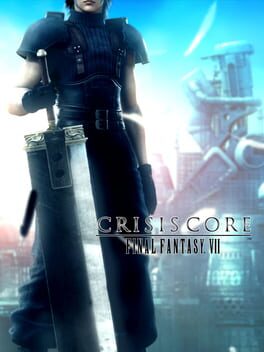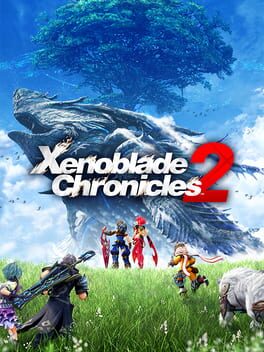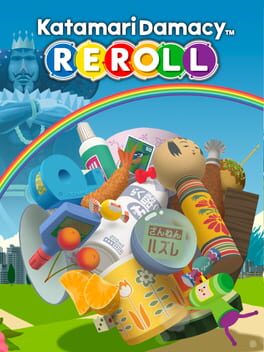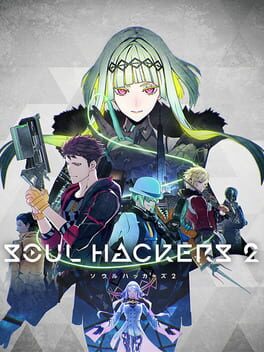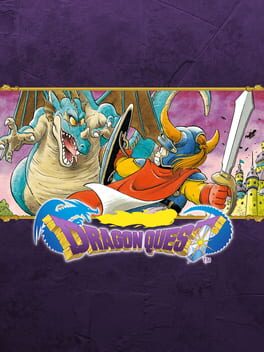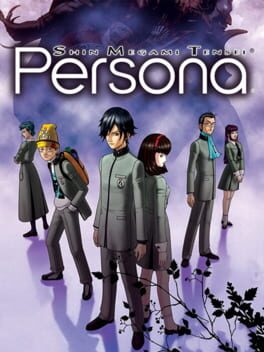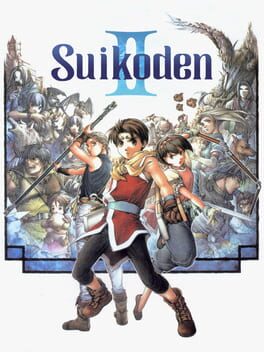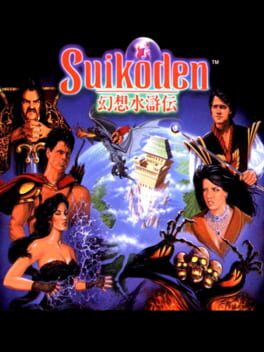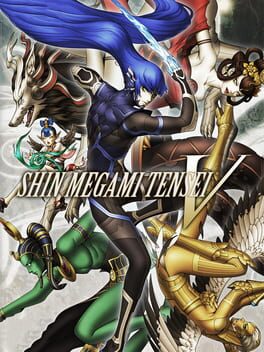Damelcamel47
25 reviews liked by Damelcamel47
Crisis Core is a game with very low lows. It's not a very fun game. The level design is boring. The combat is tedious and constantly wasting your time. The new characters introduced, especially its villain, are bottom of the barrel in the ff7 anthology. I couldn't hum a song from it that wasn't just reused from 7. However, it's made up for by one of the most lovable protagonists in video game history, his relationships with those he cares about, and especially the ending to his story. Crisis Core is a mixed bag, but among the sea of lows it is undeniable that when this game lands it is something that will leave you remembering it for years to come. The price of freedom is indeed steep..
Art, conceptually, is something that is impossible to contain in a box. It is a slippery, thrashing beast that is defined by its very lack of definition. The task of objectifying art is a task not a single soul can or will be able to do. There is no such thing as “good” or “bad” art. No right or wrong. Nothing. If beauty is in the eye of the beholder, two eyes will never see the same beauty. That, in itself, is art.
Several months ago I went to my old High School to visit my senior year art teacher. We catched up on life, as friends do, but eventually we began introspectively discussing films, shows, creation processes, and the general modern landscape of media. In the discussion of video editing, she brought up a film she had seen that she felt creatively wove together stories of completely unrelated people in a way that felt natural and expressive. In response, I described to her how that description reminded me of the video game Live A Live. She told me she did not have very much context about what video games had to offer, aside from some childhood memories and a flickering fondness for a faint handful of classics like the all-too famous Super Mario Brothers and (the not famous enough!) Dragon’s Lair.
As we continued talking about art, she continued to ask about video games and asked for my perspectives on them. I detailed my love of Dragon Quest, told her of the wondrous watercolor of Yoshitaka Amano’s work on Final Fantasy, and expressed my opinions of remake culture and other aspects of the medium. Eventually she stated, out of her own lack of experience, that she wasn’t aware of any video games that could be considered “fine art”. In response, I stated I believed there was at least one I would crown the title to. I mentioned Katamari Damacy.
To my surprise, she stated back to me that she knew that one and had actually played it long ago. She told me it was very fun. She was, and still is, right. I didn’t have the time to dive into it headfirst like I could have, but that interaction has always stuck with me. Why is Katamari Damacy fine art in my mind? What does it mean to me?
Katamari Damacy, in my eyes, tightropes a line of being both “the most video game” and “the least video game” ever. Not only does it tightrope this unique dilemma, it sways and sambas its way down that very tightrope with pride and confidence. This seemingly irreconcilable dilemma does not make much sense- how can something be the most and the least of anything at the same time? The answer to that is to simply be Katamari Damacy.
What makes something the most video game? I have played the vast majority of my video game library on my malm IKEA desk nestled in my bedroom of my child and early adulthood home. Aside from the stack of games I have played in my- coincidentally also malm IKEA desk containing- apartment bedroom, this location has made my answer to this question clear.
When I was playing Final Fantasy X, my Mom entered my room as I had the game’s sphere grid upgrade menu open. She watched my TV and was confused on what exactly the game I was playing entailed. To further the experiment, I then intentionally triggered a random encounter- detailing the user interface and strategies needed to complete the battle. In this roughly two minute endeavor, I looked at my Mom’s stone-cold poker face and asked her if she “got” the game. She did not.
When I was playing Dragon Quest VIII Journey of the Cursed King, coincidentally another PS2 video game, my Mom also entered my room. She watched my TV and was confused, though enamored enough to comment about the content she was viewing. She mentioned the music was “pretty” and she liked the “graphics”. Much the same way, I curiously entered a random encounter and detailed the user interface and strategies to complete the battle. She did not get this either, but she appreciated it and commented that she “liked it”. A step in the right direction.
When I was playing Katamari Damacy, coincidentally a PS2 era video game once more, my Mom entered my room. She watched my TV and was confused, though in a way I had not seen witnessing her reactions to Final Fantasy X or Dragon Quest VIII. I paused the game and asked what she was thinking at that moment, and she stated that she had not seen me play a game like this before. I detailed her the experience, this time all I needed to say was “You push the ball into smaller objects and it progressively grows”. There was no complicated user interface, no complicated strategies, and for the first time, it was a video game that in a sentence long description you could truly “get”. Eventually this near identical scenario found its way to my sister. She asked if she could play the game, and I handed her the controller and watched as she enjoyed her time. This was the destination.
Universal appeal makes a game become “the most video game”. Tetris. Super Mario Bros. Pac-Man. I have yet to meet a soul who is not able to recognize and/or detail their time playing the game on at least one occasion. They are “the most video game” video games. Katamari Damacy does not have the brand recognition of those gaming giants, but it is as accessible, understandable, and inherently fun as them all. Katamari Damacy is, simply, fun.
But why would it be “the least video game”? If this game is so inherent and fun to pick up and play, what would make it be “the least” of anything? Typically there is a connotation of “least” as an adjective to being negative. This is the “least” fun, this is the “least” appealing, etc. That is not the case with my usage of the word here. When I say Katamari Damacy is the “least” video game, it is me opening the doors of Pandora’s box for this is not simply a video game, but a transcendent and monumentally personal experience for my own self.
When I first played the game, I fell in love with its quirky characters, bold art direction, and incredible game design. However, I didn’t allow myself to play very much of it as I felt like I needed to savor its brilliance. Over time, I returned to the game. I played a level or two. I put it down. This pattern persisted. It was not until I saw the end credits of the game (over a year later!) in which I realized why this game was so brilliant, why I felt I needed to savor it, and why its gameplay experience was a story that I needed to be told. Katamari Damacy is not a video game, it is a symbol of life itself.
As you push around your Katamari ball and watch it grow, it grows in a way that is bumpy, uneven, and sometimes a struggle. Items chaotically fly off, you bump into buildings that pinball you with no remorse, and you hear the tire-screeching halt of fumbling around nearly as often as you successfully pick up an object. You will never complete a stage in Katamari with a perfect sphere to display in your starry sky, nor will you ever have one that mirrors someone else’s attempt. Your failure has you verbally belittled to no end. Your success is given shallow praise. You bear the weight of the universe on your shoulders, thrusted into this task alone and told only to make of it what you can and will. You simply try your best. The fictional, sticky spheres you roll in this game are more than just a colorful piece of geometry- despite not even being sentient, they are human. They are life.
It doesn’t matter that life is bumpy, uneven, and sometimes a struggle. It doesn’t matter that sometimes life chaotically throws away my plans, bumps me into scenarios that toss me around with no remorse, and makes me have to come to a screeching halt. It doesn’t matter that what I do isn’t perfect or looks different in comparison to someone else. It doesn’t matter that failure tears me apart while success is brushed aside. I bear the weight of the world on my shoulders. I am alone. I am told to make of life what I can and will. I simply try my best.
This is why Katamari Damacy is “the least video game” ever. I don’t turn on Katamari to witness a story, pump my adrenaline, or get me thinking in the same way I do with the other games that I love. I turn on Katamari because playing it is a reminder of life itself. It makes me look at it and just enjoy my time. It is simple, it is rewarding, and it is absolutely beautiful. Every time a major event in my life has occurred, good or bad, I have turned on Katamari because it brings me back down to Earth. On the best moments of my life, it is there to remind me to savor and celebrate accomplishments and the beauty life can bring. In the worst moments of my life, it reminds me that I am always growing. In the times between, it is there to simply remind me to enjoy the simple joy and fun that life brings. That feeling of having a thing to latch onto and simply feel is just simply magical. Katamari Damacy is magical.
Fine art is typically described as art that is boldly creative, stirring imagination and intellect. Fine art captivates you, it makes you feel, and it makes you think. When my teacher posed the prospect on which video game is fine art, I confidently stated Katamari Damacy. Months later, I state it confidently once more. Katamari has captivated me for years, it not only makes me feel a wide and colorful spectrum of emotion, but it gives me the tools to think and process through them as I feel.
The most well known piece of music from this games- frankly prodigious- soundtrack is a song titled “Lonely Rolling Star”. It is primarily sung in Japanese, but the song details a story of waiting for love far away. The idea of the song is inherently melancholic, but it is presented so optimistically and upbeat through its tune. Its (English) chorus states
“You’re lonely rolling star
Come on, never stop standing still!
You’re lonely rolling star
So, face forward and keep going!”
That sense of optimism, and pushing to go forward through adversity is emblematic of the magic of Katamari. It realizes the difficulty and adversity of life, and it uses its joyfulness, creativity, imagination, and optimism to simply encourage you to see the beauty within. It’s funny to think about, given this game is so silly and simple, but that only makes its effects on me personally feel more earnest. This is a video game that loves me as I love it.
Katamari Damacy is both the most and least video game ever. It is fine art. It is beautiful. It is very special. I could detail why I love individual aspects of it, why I love the development stories, and why I love the intention of its creation, and why I love the artist behind it- but none of that matters. This is a game that makes me feel, and feel I shall. At the start of this review, I stated that art is impossible to contain in a box, objectify, or properly label. That sentiment still stands, as it always will. However, I bring it up to say that despite the mountainous, downright impossible concept of such labels, I would likely call Katamari Damacy my choice for “favorite piece of art”. If someone were to come up to me and ask the question with no restriction for medium, timeframe, or genre- my answer would be Katamari Damacy.
Over the years now, I have recommended Katamari Damacy to many people, casual and hardcore video game fans alike. Of those who have tried it in my word, I often get a response of “yeah it’s fun” or “it’s neat”. Few, if any, have appreciated it on the same level as I. That’s okay, and I find that beautiful in itself. If you do play it, I hope that you can have an experience as I have, but at least one that also makes you say “yeah it’s fun” and smile. Ultimately however, just as I am, we all are lonely rolling stars. I thus say to you all, face forward and keep going.
I love this video game. Dearly.
Several months ago I went to my old High School to visit my senior year art teacher. We catched up on life, as friends do, but eventually we began introspectively discussing films, shows, creation processes, and the general modern landscape of media. In the discussion of video editing, she brought up a film she had seen that she felt creatively wove together stories of completely unrelated people in a way that felt natural and expressive. In response, I described to her how that description reminded me of the video game Live A Live. She told me she did not have very much context about what video games had to offer, aside from some childhood memories and a flickering fondness for a faint handful of classics like the all-too famous Super Mario Brothers and (the not famous enough!) Dragon’s Lair.
As we continued talking about art, she continued to ask about video games and asked for my perspectives on them. I detailed my love of Dragon Quest, told her of the wondrous watercolor of Yoshitaka Amano’s work on Final Fantasy, and expressed my opinions of remake culture and other aspects of the medium. Eventually she stated, out of her own lack of experience, that she wasn’t aware of any video games that could be considered “fine art”. In response, I stated I believed there was at least one I would crown the title to. I mentioned Katamari Damacy.
To my surprise, she stated back to me that she knew that one and had actually played it long ago. She told me it was very fun. She was, and still is, right. I didn’t have the time to dive into it headfirst like I could have, but that interaction has always stuck with me. Why is Katamari Damacy fine art in my mind? What does it mean to me?
Katamari Damacy, in my eyes, tightropes a line of being both “the most video game” and “the least video game” ever. Not only does it tightrope this unique dilemma, it sways and sambas its way down that very tightrope with pride and confidence. This seemingly irreconcilable dilemma does not make much sense- how can something be the most and the least of anything at the same time? The answer to that is to simply be Katamari Damacy.
What makes something the most video game? I have played the vast majority of my video game library on my malm IKEA desk nestled in my bedroom of my child and early adulthood home. Aside from the stack of games I have played in my- coincidentally also malm IKEA desk containing- apartment bedroom, this location has made my answer to this question clear.
When I was playing Final Fantasy X, my Mom entered my room as I had the game’s sphere grid upgrade menu open. She watched my TV and was confused on what exactly the game I was playing entailed. To further the experiment, I then intentionally triggered a random encounter- detailing the user interface and strategies needed to complete the battle. In this roughly two minute endeavor, I looked at my Mom’s stone-cold poker face and asked her if she “got” the game. She did not.
When I was playing Dragon Quest VIII Journey of the Cursed King, coincidentally another PS2 video game, my Mom also entered my room. She watched my TV and was confused, though enamored enough to comment about the content she was viewing. She mentioned the music was “pretty” and she liked the “graphics”. Much the same way, I curiously entered a random encounter and detailed the user interface and strategies to complete the battle. She did not get this either, but she appreciated it and commented that she “liked it”. A step in the right direction.
When I was playing Katamari Damacy, coincidentally a PS2 era video game once more, my Mom entered my room. She watched my TV and was confused, though in a way I had not seen witnessing her reactions to Final Fantasy X or Dragon Quest VIII. I paused the game and asked what she was thinking at that moment, and she stated that she had not seen me play a game like this before. I detailed her the experience, this time all I needed to say was “You push the ball into smaller objects and it progressively grows”. There was no complicated user interface, no complicated strategies, and for the first time, it was a video game that in a sentence long description you could truly “get”. Eventually this near identical scenario found its way to my sister. She asked if she could play the game, and I handed her the controller and watched as she enjoyed her time. This was the destination.
Universal appeal makes a game become “the most video game”. Tetris. Super Mario Bros. Pac-Man. I have yet to meet a soul who is not able to recognize and/or detail their time playing the game on at least one occasion. They are “the most video game” video games. Katamari Damacy does not have the brand recognition of those gaming giants, but it is as accessible, understandable, and inherently fun as them all. Katamari Damacy is, simply, fun.
But why would it be “the least video game”? If this game is so inherent and fun to pick up and play, what would make it be “the least” of anything? Typically there is a connotation of “least” as an adjective to being negative. This is the “least” fun, this is the “least” appealing, etc. That is not the case with my usage of the word here. When I say Katamari Damacy is the “least” video game, it is me opening the doors of Pandora’s box for this is not simply a video game, but a transcendent and monumentally personal experience for my own self.
When I first played the game, I fell in love with its quirky characters, bold art direction, and incredible game design. However, I didn’t allow myself to play very much of it as I felt like I needed to savor its brilliance. Over time, I returned to the game. I played a level or two. I put it down. This pattern persisted. It was not until I saw the end credits of the game (over a year later!) in which I realized why this game was so brilliant, why I felt I needed to savor it, and why its gameplay experience was a story that I needed to be told. Katamari Damacy is not a video game, it is a symbol of life itself.
As you push around your Katamari ball and watch it grow, it grows in a way that is bumpy, uneven, and sometimes a struggle. Items chaotically fly off, you bump into buildings that pinball you with no remorse, and you hear the tire-screeching halt of fumbling around nearly as often as you successfully pick up an object. You will never complete a stage in Katamari with a perfect sphere to display in your starry sky, nor will you ever have one that mirrors someone else’s attempt. Your failure has you verbally belittled to no end. Your success is given shallow praise. You bear the weight of the universe on your shoulders, thrusted into this task alone and told only to make of it what you can and will. You simply try your best. The fictional, sticky spheres you roll in this game are more than just a colorful piece of geometry- despite not even being sentient, they are human. They are life.
It doesn’t matter that life is bumpy, uneven, and sometimes a struggle. It doesn’t matter that sometimes life chaotically throws away my plans, bumps me into scenarios that toss me around with no remorse, and makes me have to come to a screeching halt. It doesn’t matter that what I do isn’t perfect or looks different in comparison to someone else. It doesn’t matter that failure tears me apart while success is brushed aside. I bear the weight of the world on my shoulders. I am alone. I am told to make of life what I can and will. I simply try my best.
This is why Katamari Damacy is “the least video game” ever. I don’t turn on Katamari to witness a story, pump my adrenaline, or get me thinking in the same way I do with the other games that I love. I turn on Katamari because playing it is a reminder of life itself. It makes me look at it and just enjoy my time. It is simple, it is rewarding, and it is absolutely beautiful. Every time a major event in my life has occurred, good or bad, I have turned on Katamari because it brings me back down to Earth. On the best moments of my life, it is there to remind me to savor and celebrate accomplishments and the beauty life can bring. In the worst moments of my life, it reminds me that I am always growing. In the times between, it is there to simply remind me to enjoy the simple joy and fun that life brings. That feeling of having a thing to latch onto and simply feel is just simply magical. Katamari Damacy is magical.
Fine art is typically described as art that is boldly creative, stirring imagination and intellect. Fine art captivates you, it makes you feel, and it makes you think. When my teacher posed the prospect on which video game is fine art, I confidently stated Katamari Damacy. Months later, I state it confidently once more. Katamari has captivated me for years, it not only makes me feel a wide and colorful spectrum of emotion, but it gives me the tools to think and process through them as I feel.
The most well known piece of music from this games- frankly prodigious- soundtrack is a song titled “Lonely Rolling Star”. It is primarily sung in Japanese, but the song details a story of waiting for love far away. The idea of the song is inherently melancholic, but it is presented so optimistically and upbeat through its tune. Its (English) chorus states
“You’re lonely rolling star
Come on, never stop standing still!
You’re lonely rolling star
So, face forward and keep going!”
That sense of optimism, and pushing to go forward through adversity is emblematic of the magic of Katamari. It realizes the difficulty and adversity of life, and it uses its joyfulness, creativity, imagination, and optimism to simply encourage you to see the beauty within. It’s funny to think about, given this game is so silly and simple, but that only makes its effects on me personally feel more earnest. This is a video game that loves me as I love it.
Katamari Damacy is both the most and least video game ever. It is fine art. It is beautiful. It is very special. I could detail why I love individual aspects of it, why I love the development stories, and why I love the intention of its creation, and why I love the artist behind it- but none of that matters. This is a game that makes me feel, and feel I shall. At the start of this review, I stated that art is impossible to contain in a box, objectify, or properly label. That sentiment still stands, as it always will. However, I bring it up to say that despite the mountainous, downright impossible concept of such labels, I would likely call Katamari Damacy my choice for “favorite piece of art”. If someone were to come up to me and ask the question with no restriction for medium, timeframe, or genre- my answer would be Katamari Damacy.
Over the years now, I have recommended Katamari Damacy to many people, casual and hardcore video game fans alike. Of those who have tried it in my word, I often get a response of “yeah it’s fun” or “it’s neat”. Few, if any, have appreciated it on the same level as I. That’s okay, and I find that beautiful in itself. If you do play it, I hope that you can have an experience as I have, but at least one that also makes you say “yeah it’s fun” and smile. Ultimately however, just as I am, we all are lonely rolling stars. I thus say to you all, face forward and keep going.
I love this video game. Dearly.
Soul Hackers 2
2022
You'd think the dungeon-crawling JRPG that tries its hardest to have an interesting cast, a creative world, and refreshing gameplay would have fun dungeons, dungeons that use the setting, wonderful characters, and a top quality combat system
That is not this game. This game is, above all else, boring. The dungeons are boring. They don't use the setting. The combat is so mind-numbing and repetitive- along with padded, and its topped off with a story I didn't care about and only a small handful of mildly fun characters sprinkled in. Even the music does nothing for me, where even the lowest end of my megaten experiences have tracks I will come back to.
As a Megaten fan, I am disappointed. As a Soul hackers 1 fan, I am disappointed. But even just as a jrpg fan, I can't help but feel this game didn't warrant my time and energy. The 35 hours I invested into this game felt like it was 100 for all the wrong reasons. Modern Atlus games are not doing much for me, and unfortunately, this was not the one to reel me back in.
That is not this game. This game is, above all else, boring. The dungeons are boring. They don't use the setting. The combat is so mind-numbing and repetitive- along with padded, and its topped off with a story I didn't care about and only a small handful of mildly fun characters sprinkled in. Even the music does nothing for me, where even the lowest end of my megaten experiences have tracks I will come back to.
As a Megaten fan, I am disappointed. As a Soul hackers 1 fan, I am disappointed. But even just as a jrpg fan, I can't help but feel this game didn't warrant my time and energy. The 35 hours I invested into this game felt like it was 100 for all the wrong reasons. Modern Atlus games are not doing much for me, and unfortunately, this was not the one to reel me back in.
Dragon Quest
2004
The original Dragon Quest is such a strong pioneer for both its series and the genre it created that even over 35 years later it not only has a reason to exist historically, but it still sits among- if not higher- than even modern jrpgs. Dragon Quest 1 embodies the feeling of adventure in a way that is so much fun it's hard to put down, its combat mechanics are very simple- and yet extremely rewarding and showcase the beautiful feeling of progression this genre is founded on, it's story is equally as simple and direct- but it has such a strong atmosphere and every single moment is memorable because of it. Top it off with a beautiful soundtrack, bucket loads of charm, a brevity that makes this adventure short, sweet, and replayable, and a wealth of smart and intuitive game design and there is no denying this game is an absolute classic.
Persona 1, along with its other classic Atlus peers, is something I feel video game developers should study when it comes to creating an engrossing atmosphere. This game sets up a world that even just within minutes is so interesting it's hard to not get invested. The best part is that the opening impression is not a false representation, and this game is packed with so much creativity and unique flair to its world, story, themes, characters, atmosphere, and gameplay ideas that it is absolutely unforgettable. I found myself absolutely captivated by this game during my time with it, and it certainly will be one I revisit and think about constantly. Instant classic material.
I will note that I used the PS1 ost patch, as I find it to compliment the intended vision considerably better than the PSP's music- even if the PSP soundtrack is quite good as well in its own right.
I will note that I used the PS1 ost patch, as I find it to compliment the intended vision considerably better than the PSP's music- even if the PSP soundtrack is quite good as well in its own right.
Suikoden II
1998
When you fall in love so strongly with something, sometimes it's hard to find a way to relive that experience again. I have felt this way about jrpgs for a while. I have played some excellent ones, but the childlike wonder of my all-time favorites has felt like it was something I wouldn't achieve again.
Suikoden 2 (and 1, but different story) showed me I was wrong and captured that feeling all over again. This game has everything that I could ever want out of a JRPG. Its world is so big, immersive, and developed. It has a simple but beautifully fun combat system. It has a ton of variety- whether fighting, doing army battles, duels, and recruiting the massive lineup of characters. It has wonderful music and beautiful presentation that enhances its atmosphere. It's not too long but has plenty of meat to dig into. It's replayable, with lots of role-playing in this role-playing game. Above all else though, it tells such a great story too. I refuse to spoil anything, but the way that it tells such a small, personal, and investing story with its characters on such a large scale that adds as much weight as it does memorable moments is fantastic. I love this game. I think the fact that I'm already itching to revisit it just a couple of months later is a sign of something special. wonderful
Suikoden 2 (and 1, but different story) showed me I was wrong and captured that feeling all over again. This game has everything that I could ever want out of a JRPG. Its world is so big, immersive, and developed. It has a simple but beautifully fun combat system. It has a ton of variety- whether fighting, doing army battles, duels, and recruiting the massive lineup of characters. It has wonderful music and beautiful presentation that enhances its atmosphere. It's not too long but has plenty of meat to dig into. It's replayable, with lots of role-playing in this role-playing game. Above all else though, it tells such a great story too. I refuse to spoil anything, but the way that it tells such a small, personal, and investing story with its characters on such a large scale that adds as much weight as it does memorable moments is fantastic. I love this game. I think the fact that I'm already itching to revisit it just a couple of months later is a sign of something special. wonderful
Link to the past's greatest strength and weakness simultaneously is that it is an extremely solid foundation. This game is about as straightforward as Zelda gets- and that's great! Zelda is a ton of fun, so getting a no-frills, no-fat Zelda game is an inherently great time. As a foundation though, it has allowed for expansion and refinement over time that makes this game comparatively a little bit behind. However, there is absolutely no denying that this is a classic regardless. Great time
Suikoden
1995
Suikoden 1 was a very pleasant surprise. I had heard pretty much nothing before going into it, and it ended up being a pretty bright highlight of the genre for me. This game is a super short, sweet, but best of all dense jrpg experience and it's just packed with so much greatness at every corner without any fat. I loved this games story, it has a wonderful cast, it's presentation is fantastic, and while there was room to add some QOL features to a couple of elements it was just overall really fun. I love this game to death, and it's one I can see myself revisiting all the time. Excellent game
Shin Megami Tensei V
2021
SMT5 is one of the best examples of a game being painfully boring. Everything about this game is boring, both comparatively to past megaten entries and just as a standalone product.
The opening few hours are pretty neat, but it's one of those things where the intrigue of a mystery is significantly more fun than watching the mystery unfold, and as it continues it loses all the appeal. SMT is one of my favorite franchises of all time and one of the reasons is how they're bursting with creativity in every corner. Even back in the Super Famicom days, games like SMT1 and 2 have so many memorable set pieces and story events that make them unforgettable- but in 5 you walk around an empty desert- no dungeons or towns or anything of the sort- then copy and paste that 4 times with a different camera filter. The story and characters in SMT are criticized for being thin, which is something I have never agreed with in the past, but this game feels like the exact target those critics are pointing at. Nothing happens in this game, nothing is exciting or meaningful, and the characters presented are so bland and forgettable that I legitimately struggle to remember some of their names. It feels so empty, unplanned, and half baked.
The gameplay is another area that fell short of expectations, as it completely removed the fun of the SMT3/4 battle system with its tweaks here. Those games were so fun because of how much you could experiment in so many different ways and ultimately make it so you could wipe the floor with enemies and bosses even if they were leaps of levels above you, assuming you can face the risk of them doing the same to you. This time, there's a level scaling system that makes it so if you don't match similar levels- you will just not be effective. It pads every fight, removes the need and fun for experimenting and creative problem solving, and ultimately makes it unfun. That's not even mentioning things like the new magatsuhi meter which removes even more of the fun, or how bosses are loaded with piercing moves that negate the need to plan a party strategically as it won't matter.
What we are left here is a jrpg with a boring story, cast, gameplay system, atmosphere, music, and more. There's hints of good stuff here- the demons especially are great to see in 3D and have tons of great and fun dialogue, and fusion is always satisfying, as some examples- but those aspects are buried underneath one of the most unsatisfyingly empty and shallow experiences I have ever had in the genre. I am thoroughly disappointed with this game, not because I was super hyped going in or for how it doesn't live up to its predecessors- but because this is just not a very good video game in general.
The opening few hours are pretty neat, but it's one of those things where the intrigue of a mystery is significantly more fun than watching the mystery unfold, and as it continues it loses all the appeal. SMT is one of my favorite franchises of all time and one of the reasons is how they're bursting with creativity in every corner. Even back in the Super Famicom days, games like SMT1 and 2 have so many memorable set pieces and story events that make them unforgettable- but in 5 you walk around an empty desert- no dungeons or towns or anything of the sort- then copy and paste that 4 times with a different camera filter. The story and characters in SMT are criticized for being thin, which is something I have never agreed with in the past, but this game feels like the exact target those critics are pointing at. Nothing happens in this game, nothing is exciting or meaningful, and the characters presented are so bland and forgettable that I legitimately struggle to remember some of their names. It feels so empty, unplanned, and half baked.
The gameplay is another area that fell short of expectations, as it completely removed the fun of the SMT3/4 battle system with its tweaks here. Those games were so fun because of how much you could experiment in so many different ways and ultimately make it so you could wipe the floor with enemies and bosses even if they were leaps of levels above you, assuming you can face the risk of them doing the same to you. This time, there's a level scaling system that makes it so if you don't match similar levels- you will just not be effective. It pads every fight, removes the need and fun for experimenting and creative problem solving, and ultimately makes it unfun. That's not even mentioning things like the new magatsuhi meter which removes even more of the fun, or how bosses are loaded with piercing moves that negate the need to plan a party strategically as it won't matter.
What we are left here is a jrpg with a boring story, cast, gameplay system, atmosphere, music, and more. There's hints of good stuff here- the demons especially are great to see in 3D and have tons of great and fun dialogue, and fusion is always satisfying, as some examples- but those aspects are buried underneath one of the most unsatisfyingly empty and shallow experiences I have ever had in the genre. I am thoroughly disappointed with this game, not because I was super hyped going in or for how it doesn't live up to its predecessors- but because this is just not a very good video game in general.
